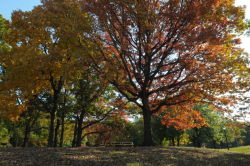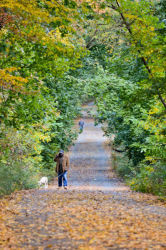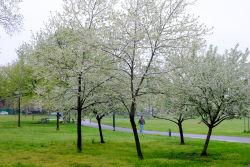Cunningham Park
Sy Spyler Field
Only a few months after he was married, Sy Spyler (1937-1998) began coaching Little League baseball, and he continued to volunteer for over 35 years. Most of those years he worked as a local coach. Even more than his enthusiasm for baseball, his love of working with children led Spyler to dedicate much of his time to coaching.
After he graduated from Theodore Roosevelt High School (P.S. 435) in the Bronx, Spyler became a union plumber. He worked on plumbing aspects of bridge projects before moving on to work for the New York City Housing Authority, where he did inspections and worked on reconstruction projects. Between 1955 and 1957 he was on active military duty in Europe. He was in the Army’s Special Services, where he played baseball and won the All Europe Championship with his team. Returning to the United States, he was drafted by the Chicago White Sox as a catcher, but was not able to play due to an injury. He married his wife Susan in 1963 and moved to Oakland Hills. Together they had two sons, one of whom is also a Little League coach now.
Located at 210th Street and 73rd Avenue, this is the closest ballfield to Spyler’s home in Windsor Park. It was known simply as “Field #7” until Council Member Sheldon Leffler asked Parks to change the name to honor Spyler’s dedication to Little League in 1999. This field is equipped with a backstop, seating for the players, concrete bleacher seating for spectators, and two drinking fountains. Located next to the field is 210th Street Playground. The ballfield and the playground are part of Cunningham Park. Originally named Hillside Park, it was renamed for W. Arthur Cunningham (1894-1934) the year that he died. Cunningham was the Comptroller during Mayor Fiorello H. La Guardia’s (1882-1947) administration and died suddenly of a heart attack during his term.
The site of Cunningham Park was first suggested on the map of Greater New York drafted in 1900. The map was created under the direction of Louis Risse, the chief engineer of New York City’s Topographical Bureau who designed the Grand Concourse in the Bronx, and it measured 27 by 31 feet. Displayed at the Paris Exposition, it was one of the most popular attractions, along with the Metro, Paris’s new subway, which opened four years before New York’s first line. The map proposed to tie the newly merged boroughs together with parks, boulevards, and highways. The City gradually acted on many of the proposals on Risse’s map, including the creation of a park on this site, buying parcels of land between 1928 and 1944.
Among the parcels that were merged to create Cunningham Park was the first automobile highway in the United States. Built in 1908 by William K. Vanderbilt Jr. as a toll road, its financial performance worsened as the public highway system grew. It finally closed in 1938, and has become a tree-lined path within the park. Walkers, joggers, and bicycle riders now use the former Motor Parkway.
Between Cunningham and Alley Pond Parks, attractive co-ops fill most of the area around 73rd Avenue. Alley Pond Park was another Risse proposal, and together with Cunningham Park, it helps define the neighborhood that sits between Union Parkway and 48th Avenue. Its name, Oakland Gardens, combines references to a mansion built by Frederick Newbold Lawrence in 1847 named “The Oaks” and the extensive gardens and greenhouses that opened there in 1859. The area slowly developed with middle class homes in the late 19th century. The Oakland Golf Club, formerly located on the site of the Queensborough Community College, had prominent members including Governor Alfred E. Smith (1873-1944) and Senator Robert F. Wagner (1877-1953). After World War II, the area began developing more rapidly with single family homes, apartment complexes, and co-ops.
Check out your park's Vital Signs
Clean & Safe
Green & Resilient
Empowered & Engaged Users
Share your feedback or learn more about how this park is part of a
Vital Park System
Contacts
Cunningham Park: (718) 217-6452










